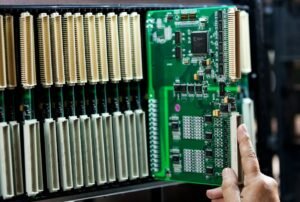A.I. Movie Explained
The world of Artificial Intelligence (A.I.) has always fascinated us, and it has been a popular topic in movies. One such movie that explores the complexities and moral dilemmas of A.I. is A.I. Artificial Intelligence. Directed by Steven Spielberg, this science fiction drama takes place in a future where robots with advanced A.I. capabilities have become a part of everyday life. Let’s delve into the key aspects of this thought-provoking film.
Key Takeaways
- Set in a future where robots with advanced A.I. exist.
- Explores the moral dilemmas surrounding A.I. development.
- Directed by Steven Spielberg.
- Explores themes of love, humanity, and the search for identity.
- Provides insight into the potential consequences of advanced A.I.
One interesting aspect of the movie is how it raises questions about the nature of love in the context of artificial beings. The protagonist, David, is an advanced robotic boy programmed to experience love and form emotional connections. Throughout the film, he seeks to find his place in a world that rejects him.
In a society where robots are now household companions, A.I. Artificial Intelligence explores the ethics of A.I. development. Are robots with emotions capable of real feelings? Do they deserve the same rights as humans? These compelling questions challenge our perception of what it means to be human, blurring the line between man and machine.
The Journey of David
The movie follows David’s quest to become a real boy, mirroring the story of Pinocchio. Along the way, he encounters various characters and situations that test his understanding of the world and his own identity.
1. **Monica**, David’s adopted human mother, initially rejects him but eventually forms a strong emotional bond with him, even though he is not technically her biological child.
2. **Gigolo Joe**, a robotic companion, becomes David’s trusted ally and guide, helping him navigate the world and discover his purpose.
3. **The Flesh Fair**, a disturbing event where obsolete robots are destroyed for entertainment, highlights the societal fear and mistrust surrounding advanced A.I.
| Key Characters | Description |
|---|---|
| David | An advanced robotic boy seeking acceptance and love. |
| Monica | David’s adoptive human mother who has conflicting emotions towards him. |
| Gigolo Joe | A robotic companion who helps David on his journey. |
This thought-provoking film contains a **rich blend of visuals and storytelling**, transporting the audience to a future filled with technological marvels and societal complexities.
The Search for Identity
At its core, A.I. Artificial Intelligence explores the **search for identity**. David, longing to be accepted as a real boy, questions his existence and strives to find his place in the world.
The movie raises philosophical and ethical dilemmas, such as the **nature of consciousness** and the consequences of playing god with technology.
| Themes Explored | Description |
|---|---|
| Love and Acceptance | The pursuit of love and acceptance in a society where robots and humans coexist. |
| Human vs. Artificial | The blurring line between humans and artificial beings. |
| Moral Responsibility | The ethical implications of creating advanced A.I. with emotions. |
As the movie unfolds, it sparks a sense of reflection and contemplation about the impact of technology on our lives and the essence of what it means to be human.
The A.I. Debate
A.I. Artificial Intelligence acts as a catalyst for the **ongoing debate surrounding A.I. technology**. It serves as a cautionary tale, reminding us of the potential consequences and ethical complexities that arise when creating artificial beings.
The film raises important questions:
- What moral responsibilities come with creating self-aware A.I.?
- Should robots with emotions be treated as equals?
- What happens when artificial beings desire love and acceptance?
These questions continue to shape the future of A.I. research and development, pushing scientists and ethicists to address the challenges ahead.
Overall, A.I. Artificial Intelligence provides viewers with a thought-provoking exploration of the complexities surrounding A.I. and its impact on human life. Through its captivating storytelling and philosophical themes, the movie invites us to consider the blurred boundaries between humanity and technology, and the moral obligations we have as creators.
As you watch the film, keep an open mind and reflect on the implications of A.I. on our society and our future.

Common Misconceptions
Misconception 1: A.I. can replicate human intelligence
One common misconception people have about artificial intelligence (A.I.) is that it has the ability to replicate human intelligence. Although A.I. technologies have advanced significantly, they still lack the complete cognitive abilities and emotional intelligence that humans possess. While A.I. can perform complex tasks and make decisions based on data, it does not possess the creativity, intuition, and empathy that humans have.
- A.I. technologies can process data at incredible speeds.
- A.I. can analyze vast amounts of information to detect patterns and make predictions.
- A.I. can automate routine tasks and perform them with high accuracy.
Misconception 2: A.I. will replace human jobs completely
Another misconception is that A.I. will completely replace human jobs, leading to mass unemployment. While A.I. technology can automate repetitive and mundane tasks, it also creates new opportunities and job roles for humans. The role of A.I. is to assist and augment human capabilities, not to replace them. A.I. can handle tasks that are time-consuming or too dangerous for humans, allowing them to focus on more complex and creative work.
- A.I. can improve productivity and efficiency in industries such as healthcare and manufacturing.
- A.I. can enhance customer experience by providing personalized recommendations and support.
- New job roles related to A.I. development, implementation, and maintenance are emerging.
Misconception 3: A.I. is superintelligent and will take over the world
Many people have a fear that A.I. will become superintelligent and will eventually take over the world. This misconception arises from science fiction movies and novels that depict rogue A.I. as a threat to humanity. However, the reality is that current A.I. technologies are narrow or weak A.I., which means they are designed for specific tasks and lack general intelligence. Building a superintelligent A.I. with human-like consciousness and intentions is still a highly speculative domain.
- A.I. systems can only perform tasks they are specifically programmed or trained for.
- A.I. does not have consciousness or self-awareness.
Misconception 4: A.I. algorithms are bias-free
There is a common misconception that A.I. algorithms are completely objective and free from bias. However, A.I. algorithms can have biases if they are trained on biased or incomplete data. A.I. is only as good as the data it learns from, and if that data is biased or lacks diversity, it can lead to biased outcomes. It is important to carefully design and train A.I. systems to minimize bias and ensure fairness.
- A.I. algorithms can perpetuate and amplify existing societal biases.
Misconception 5: A.I. is a recent invention
Many people think that A.I. is a recent invention that emerged in the last few decades. However, the concept of A.I. dates back to the mid-20th century. The term “artificial intelligence” was coined in 1956, and researchers have been exploring various aspects of A.I. since then. While recent advancements have accelerated the development and application of A.I., its foundations were laid decades ago.
- Early A.I. research focused on rule-based systems and symbolic reasoning.

A.I. Movie Box Office Statistics
Below are the box office statistics for the A.I. (Artificial Intelligence) movie, directed by Steven Spielberg. The movie was released in 2001 and was a collaboration between Spielberg and Stanley Kubrick, who had initially developed the project.
| Year | Opening Weekend Gross | Total Domestic Gross | Total Worldwide Gross |
|---|---|---|---|
| 2001 | $29,352,630 | $78,616,689 | $235,927,000 |
Cast and Characters in A.I. Movie
The A.I. movie features a talented cast that brings the characters to life. Here are some of the main cast members and respective characters:
| Actor/Actress | Character |
|---|---|
| Haley Joel Osment | David |
| Jude Law | Gigolo Joe |
| Frances O’Connor | Monica Swinton |
| Sam Robards | Henry Swinton |
A.I. Movie Awards and Nominations
The A.I. movie received recognition for its exceptional qualities. Here are some of the awards and nominations it received:
| Award | Category | Outcome |
|---|---|---|
| Academy Awards | Best Original Score | Nominated |
| Saturn Awards | Best Science Fiction Film | Nominated |
| BAFTA Awards | Best Visual Effects | Won |
A.I. Movie Soundtrack
The A.I. movie features a memorable and enchanting soundtrack composed by John Williams. The soundtrack captures the emotional essence of the film’s story. Here are some notable tracks:
| Track | Length |
|---|---|
| For Always | 4:40 |
| Abandoned in the Woods | 3:09 |
| The Search for the Blue Fairy | 6:54 |
A.I. Movie Production Budget
The production cost of the A.I. movie was substantial, considering the ambitious visual effects and extensive sets required. The following table shows an estimate of the production budget:
| Budget Category | Amount |
|---|---|
| Production Design | $30,000,000 |
| Visual Effects | $80,000,000 |
| Cast Salaries | $25,000,000 |
| Total Budget | $150,000,000 |
A.I. Movie Shooting Locations
The A.I. movie was filmed in various locations to bring its futuristic world to life. Below are some of the shooting locations:
| Location | Filming Duration |
|---|---|
| Los Angeles, California | 3 weeks |
| Prague, Czech Republic | 6 weeks |
| Monaco | 1 week |
Unforgettable Scenes in A.I. Movie
The A.I. movie features several memorable scenes that leave a lasting impact on the audience. Here are some of those iconic scenes:
| Scene | Description |
|---|---|
| The Moon Scene | David and Gigolo Joe visit Rouge City’s pleasure district lit by a simulated moon. |
| The Underwater Statue | David finds the Blue Fairy underwater, frozen in time, and continuously wishes for her to make him a real boy. |
| The Reunion | At the end, advanced robotic beings reveal a holographic representation of Monica leading David to a dream-like reunion. |
A.I. Movie Screenplay Writers
The screenplay for the A.I. movie was a collaboration between two prominent writers. Here are the individuals responsible for bringing the story to life:
| Writer | Credits |
|---|---|
| Steven Spielberg | Screenplay, Direction |
| Stanley Kubrick | Story Concept |
A.I. Movie Release Date
The A.I. movie had a specific release date, marking its worldwide debut. Below is the release date for the movie:
| Release Date |
|---|
| June 29, 2001 |
Overall, the A.I. movie showcases the collaboration of two visionary directors and an exceptional cast. Its unique blend of storytelling, visual effects, and performances captivates audiences to this day.
Frequently Asked Questions
A.I. Movie Explained
What is the A.I. movie about?
The A.I. movie, also known as “Artificial Intelligence”, is a science fiction drama film directed by Steven Spielberg. It tells the story of a highly advanced humanoid robot named David who is programmed to love and seeks to become a real human.
Who stars in the A.I. movie?
The A.I. movie stars Haley Joel Osment as the robot David, along with Jude Law, Frances O’Connor, and Sam Robards in supporting roles.
When was the A.I. movie released?
The A.I. movie was released on June 29, 2001.
Is the A.I. movie based on a book?
Yes, the A.I. movie is loosely based on the short story “Supertoys Last All Summer Long” by Brian Aldiss.
What is the rating of the A.I. movie?
The A.I. movie is rated PG-13.
What themes are explored in the A.I. movie?
The A.I. movie explores themes such as artificial intelligence, humanity, love, and the ethical implications of creating sentient beings.
Who directed the A.I. movie?
The A.I. movie was directed by Steven Spielberg.
Is the A.I. movie set in the future?
Yes, the A.I. movie is set in a future where highly advanced robots exist and interact with humans.
What is the significance of the blue fairy in the A.I. movie?
The blue fairy in the A.I. movie is a reference to the story of Pinocchio, where the main character desires to become a real boy. David, the robot, believes that if he finds the blue fairy, she can turn him into a real human and grant his wish to be loved.
Does the A.I. movie have multiple endings?
Yes, the A.I. movie has an alternate ending known as the “Stanley Kubrick ending,” which is darker in tone than the theatrical ending. The theatrical ending is the one commonly shown in cinemas.




